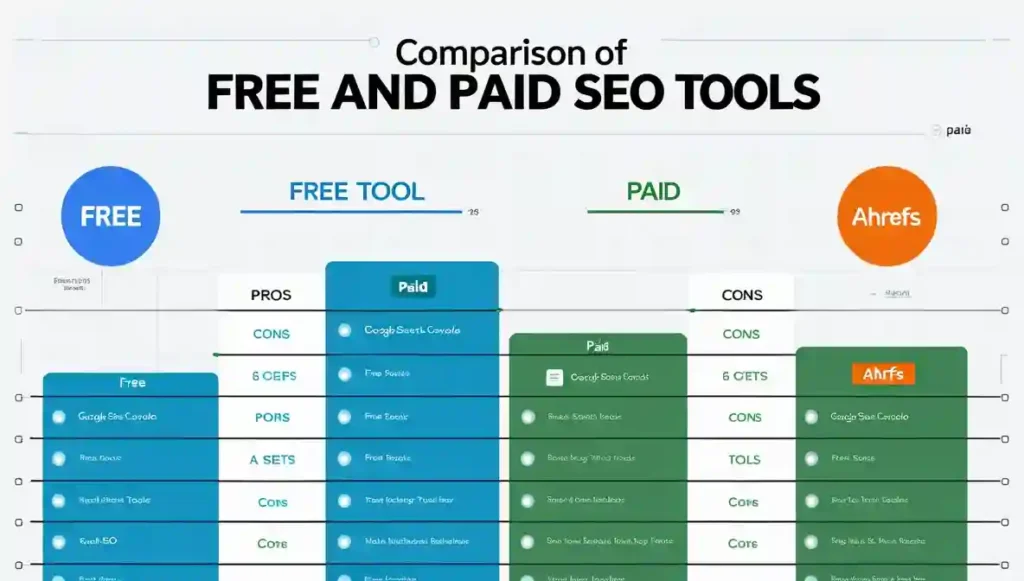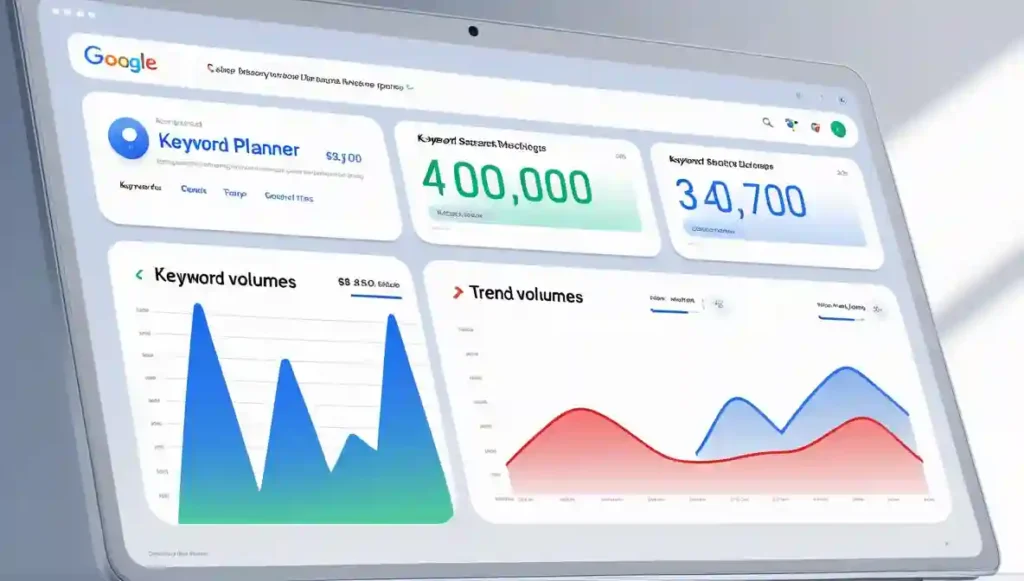
Best Free AI SEO Tools and Underrated for Bloggers in 2025
Finding the right SEO tools as a blogger in 2025 can feel overwhelming. Big names like Semrush, Ahrefs, and Surfer SEO are everywhere, but if you’re just starting or working on a budget, the cost can be scary.
I’ve been there — writing late at night, trying to figure out which keywords to target without spending hundreds on premium tools. That’s when I started digging into free AI SEO tools. Some were obvious, but others were hidden gems that nobody was talking about. In this guide, I’ll walk you through 12+ free and underrated AI SEO tools every blogger should know in 2025.
Why Free AI SEO Tools Matter for Bloggers

Blogging isn’t easy, especially when you’re just starting out. You need to:
- Find the right keywords
- Write content that ranks
- Track performance
- Keep up with SEO changes
Paid tools are great, but free tools can give you 80% of the value without the price tag if you use them smartly. The trick is knowing which ones actually work and how to combine them.
The Top Free AI SEO Tools for Bloggers in 2025
Let’s go tool by tool with features, limits, and my personal experience.
1. Google Keyword Planner (Free)

- Best for: Keyword volume insights and search trends
- Features: Keyword ideas, volume, competition estimates
- Limitations: Weak on long-tail keyword ideas
📌 Personal note: When I was writing about “color psychology in homes,” Keyword Planner helped me find that “blue bedroom ideas” had surprising search volume. That post became one of my top traffic drivers.
2. Ubersuggest (Free/Paid)
- Best for: Keyword ideas, basic SEO scoring
- Free limits: Daily search caps
- Why it’s good: Beginner-friendly, easy to navigate
📌 My experience: Ubersuggest was my very first SEO tool. I loved how it showed keyword difficulty in colors (green = easy, red = hard). For a beginner, that made decision-making simple.
3. ChatGPT (Free version)

- Best for: Blog outlines, keyword brainstorming, content ideas
- Limitations: Doesn’t give live SEO metrics
📌 How I use it: I often prompt ChatGPT with:
“Give me 20 long-tail keywords about [topic] with low competition.”
Then I cross-check the results in Ubersuggest or Google Keyword Planner. The mix works beautifully.
4. Google Trends (Free)
- Best for: Seasonal and trending keywords
- Features: Compare keywords, see rising/falling interest
📌 Story: One December, I noticed “Christmas nails 2024” trending in Google Trends. I quickly wrote a post with that phrase — by Christmas week, it was pulling in traffic like crazy.
5. Google Search Console (Free)
- Best for: Tracking site performance
- Features: Keyword impressions, clicks, average position
📌 My lesson: The first time I checked Search Console, I was shocked. My post wasn’t ranking for my target keyword, but it was ranking for something else entirely. That taught me to optimize based on actual data, not just guesses.
6. ProductRank.ai (Free)
- Best for: Tracking how your site shows up in AI search engines like ChatGPT, Claude, or Perplexity.
- Why it’s unique: Most tools don’t cover AI search yet — but this one does.
📌 If you’re a brand blogger: This helps you see if AI is recommending your site when people ask questions.
7. SEO.AI Free Suite (Free, no login)
- Best for: Quick SEO checks and tasks
- Features: 46 free tools — keyword cannibalization checker, rank tracking, paragraph generation, and more
📌 What I love: No login, no sign-up. Sometimes I just need a quick fix, and this toolset is like having a free Swiss Army knife for SEO.
8. Nightwatch.io Free Tools
- Best for: SERP and competitor analysis
- Features: Rank tracking, Chrome extensions for SEO insights
📌 Why it’s underrated: Most beginners don’t know about it, but it’s powerful for checking where your site stands against others.
9. Writesonic Free Plan
- Best for: AI-powered content writing + site audits (100 pages)
- Features: SEO-focused blog writing with keyword suggestions
- Bonus: WordPress integration
📌 Tip: If you’re stuck writing product reviews or listicles, Writesonic can draft fast. Just make sure to edit for a personal touch.
10. Mangools Free Tools
- Best for: User-friendly keyword research
- Tools included: KWFinder, SERPChecker, SERPWatcher
- Limitations: Daily search limits
📌 How I used it: Mangools was where I found “cheap matte car paint ideas” — a keyword that turned into one of my highest-performing posts in my car color niche.
11. Koala AI (Free Tier)
- Best for: SEO writing with tone control (casual, professional, or even news-style)
- Free plan: 5,000 words/month (around 1–2 articles)
📌 Why I recommend it: Sometimes I want my writing to sound professional or emotional, not robotic. Koala lets me adjust the tone so the article feels more human.
12. Answer The Public (Free limited)
- Best for: Generating questions and FAQ keywords
- Why it’s gold: Great for clusters like “How do I…?” and “What is the best…?”
📌 Story: I used it for a post on “AI writing for students.” One of the top questions was “Can AI write essays legally?” That became my blog’s FAQ section and brought in steady traffic.
Quick Summary Table (Mobile-Friendly)
| Tool | Free Features | Best Use | Limitations |
| Google Keyword Planner | Keyword volume | Starter research | Weak on long-tail |
| Ubersuggest | Keyword ideas, SEO scoring | Beginner-friendly | Daily caps |
| ChatGPT | Outlines, keyword brainstorming | Content ideation | No live SEO data |
| Google Trends | Trend analysis | Seasonal topics | Needs cross-check |
| Google Search Console | Site performance data | SEO health check | Only works on your site |
| ProductRank.ai | AI search tracking | Brand visibility | New tool, less known |
| SEO.AI Suite | 46 SEO tools | Quick checks | No deep analytics |
| Nightwatch.io | SERP tracking | Competitor insights | Free features limited |
| Writesonic | AI content writing | SEO-focused posts | Limited usage |
| Mangools | KWFinder, SERP tools | Easy keyword research | Daily caps |
| Koala AI | Tone-customized writing | Professional/emotional style | Only 5k words free |
| Answer The Public | User questions | FAQ/LSI keywords | Limited free runs |
Final Thoughts

Free AI SEO tools won’t replace premium platforms, but they’re more than enough for beginner bloggers, students, and anyone building authority on a budget.
Here’s what I’d suggest:
- Start with Google Keyword Planner + Ubersuggest + ChatGPT for keyword discovery.
- Use Google Trends + Answer The Public for content ideas.
- Track performance with Google Search Console + Nightwatch.io.
- When writing, experiment with Koala AI or Writesonic for polished SEO content.
📌 My takeaway: Blogging success isn’t about having the fanciest tool. It’s about knowing how to use what’s free, write with your own voice, and keep testing. AI tools are here to make the journey easier, but your human creativity is what makes your blog stand out.
Frequently Asked Questions About Free AI SEO Tools for Bloggers in 2025
Q1: Can free AI SEO tools really compete with paid ones?
When I first started, I thought only paid tools like Semrush or Ahrefs could move the needle. But after months of using free tools like Google Keyword Planner, Ubersuggest, and ChatGPT, I realized that free AI SEO tools provide 80% of the benefit for 0 cost—if you know how to mix and match them. The trick isn’t the tool price, but how well you use these tools to find low-competition keywords and create smart content.
Q2: How do I combine these free tools effectively?
That was a major puzzle for me initially. I’d jump around different tools but felt lost until I created a workflow: start with seed keywords on Google Keyword Planner, expand with ChatGPT’s long-tail keyword prompts, validate with Ubersuggest, then track performance using Google Search Console and Nightwatch.io. This simple combo saved me hours weekly and helped my blog traffic climb steadily.
Q3: What’s the best free tool for beginner bloggers on a tight budget?
Honestly, Google Keyword Planner and ChatGPT free version are my top picks for beginners. Google Keyword Planner gives you reliable keyword volume and trends, while ChatGPT sparks creative keyword ideas and blog outlines. I remember using just these two in my first three months—it was enough to get a solid content plan.
Q4: Are these free AI SEO tools reliable for long-term blogging?
They are! I’ve been using many of these tools for over a year now, and they keep evolving with SEO trends. Of course, periodic checks with paid audits help, but staying consistent with free tools like Google Trends for seasonality and Answer The Public for FAQs has kept my content fresh and ranking well.
Q5: How do I avoid getting SEO penalties using free AI content tools?
Good question! I once published a post generated mostly by AI with little editing and faced duplicate content warnings. Since then, I always humanize AI-generated content by adding personal anecdotes, restructuring text, fact-checking every claim, and sprinkling semantic keywords naturally. Using plagiarism checkers like Copyscape or Originality.ai helps too.
Q6: Can these tools help me optimize for voice search and AI-driven answers?
Absolutely. Tools like ProductRank.ai and SEO.AI’s free suite help track your brand visibility in AI search engines like ChatGPT. Plus, ChatGPT can help brainstorm conversational keywords to include. When I updated my FAQs using questions from Answer The Public, I noticed better “People Also Ask” and voice search impressions.
Q7: Do these tools work for non-English bloggers or regional content?
Great question—I blog in English and a regional language. Free AI SEO tools like ChatGPT and Writesonic now support multilingual keyword research and content creation. You just need to tailor prompts and localize keywords. It’s not perfect, but it’s getting better every day.
Q8: What about site audit tools? Are there free AI options?
Yes! Writesonic offers limited free site audits, which helped me identify slow-loading pages and broken links early on. Nightwatch.io and SEO.AI Suite also give quick SEO health checks. While not as in-depth as premium audits, they’re perfect for beginners, keeping costs down.
Q9: How can I find underrated or niche tools worth trying?
Honestly, some of my best finds were from forum discussions and SEO communities. Tools like ProductRank.ai or SEO.AI’s 46-tool suite are less hyped but incredibly helpful. I like to experiment and test these alongside my main tools. My advice: keep exploring and share experiences in SEO groups for hidden gems.

Pingback: 14 On-Page SEO Tips You Can’t Ignore in 2025 - zadaaitools.com